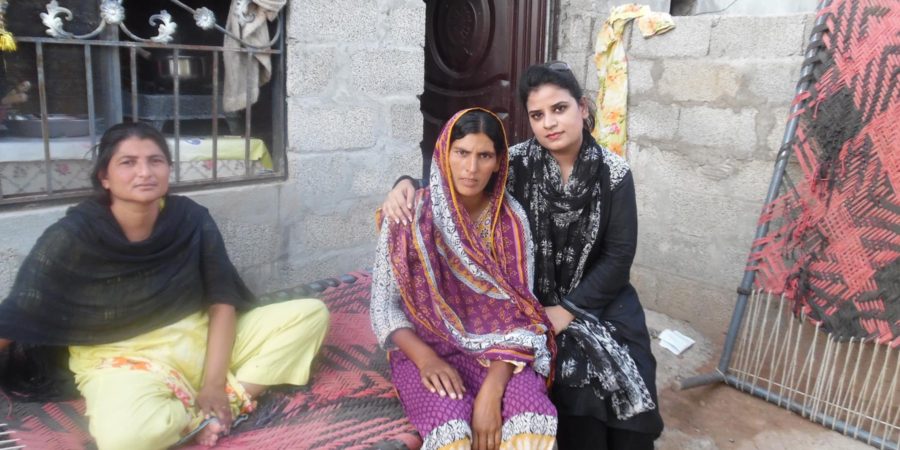Life of Christians in a slum area By Sadaf Bashir

Blasphemy laws which can punish somebody for insulting Islam with even death are now regarded sacrosanct in Pakistan. Unfortunately in some cases these laws are misused in order to settle petty grievances. This piece, takes into account one blasphemy case against Rimsha Masih a minor girl in Islamabad, in August 2012 and its impact on her colony fellows. An effort has been made to explain the agony and trauma the Christians community as a whole experience invariably when such incidents take place.
What happened?
When Rimsha Masih was accused of allegedly desecration of Holy Quran in August 2012, the reaction of the people from the Muslim community was naturally hostile. The Christian community came under severe threat, because it had already faced unseemly situation in Gojra, Joseph Colony, Lahore and Shanti Nagar. Due to this fear, people from Mehrabad, took refuge in different areas of the twin cities and most of them shifted to a slum area in Sector H-9.
Shifting to Sector H-9
Owing to socio-economic conditions, Christian families like other people migrated to the capital city from different parts of the country in search of a better living. Most of them settled in slums. Among these settlements, one of them was near the Rawal lake. As the land was not allotted to them, therefore, the government displaced them in 2010. They temporarily shifted to H-9 Sector where the affected families started living in tents. Most of these families belong to the poorest segments of the society, while males are mostly sanitary workers, hawkers, daily wagers or doing some low income jobs, the females mostly are sanitary workers and maids.
The people of Mehrabad were also forced to leave their place in September 2012 and also shifted to H-9.
- The families had to run away from their homes having little or no belongings and survive in tents in harsh weather of Islamabad with no civic amenities.
- Many have to leave their work, faced financial problems due to no or less work consequently leading to poverty that caused health issues especially among children and pregnant women.
- For economic reasons alone the children do not go to schools especially girls as the settlement is at distance which has increased the school dropout ratio but correspondingly increased the ratio of underage maids. These girls face different types of violence and abuse.
- There is threat of female abduction with girls becoming victims of early marriages.
- CDA officials often visit the settlement and threaten to demolish the tents but settle after demanding bribery. Some families have even constructed houses after bribing the CDAs officials. If the settlement at some stage undergoes a demolition process to get the land vacated, this will create similar issues for the community experienced in other sectors.
- In this community either you purchase the drinking water or those who cannot afford to purchase it are forced to fetch water from a distance. Likewise, some have arranged solar lights while the poorer majority relies on kerosene oil lamps.
- There were many incidents of robbery and thefts by gangsters and families were looted in broad day light or soon after dark.
- In four years, none of the influential government official or a parliamentarian ever visited the camp. Only some people from a political party once visited during an election campaign.
Even being from same religious background certain hurdles restrict these families to interact with one another. There is only one church and one is under construction but they pray and celebrate the festivals separately. The business terms are also affected and the people of one part do not buy things from shops of other part of the camp.
Different NGOs have started different projects especially training of domestic maids but again the girls of one part are not sent to join centers established in other part. Talking about this strange situation Ms. Rubina Shaheen Bhatti Director Youth Development Association (YDA), who has established a skill center for females, says with despair “we have tried our best to motivate people to avoid such attitudes and support each other especially in capacity building of their girls who are forced to work as domestic maids but all in vain”.
I conducted meetings, formal and informal interviews of different people from both parts of the camp to get first hand information and also met with a couple of NGOs’ workers who have been working there. The number of Mehrabadi families is about 750 while the total families in the camp are about 1200. The population of about 7200 of this settlement is either victims of the aftermaths of desecration incident or poverty while the majority is under constant fear. They have been penalized for crimes they actually never committed!!
Related News

NDU hosts Bangladesh Air Chief to deepen bilateral defence cooperation
RAWALPINDI, JAN 8 /DNA/ – Air Chief Marshal Hasan Mahmood Khan, Chief of the AirRead More

PM Shehbaz unveils multi-billion rupee development plan for Balochistan
Bureau Report QUETTA, JAN 8 /DNA/ – Prime Minister Muhammad Shehbaz Sharif has announced numerousRead More


Comments are Closed